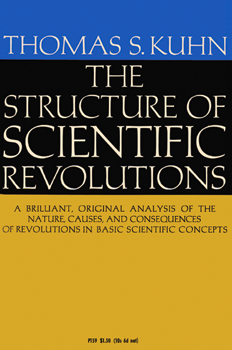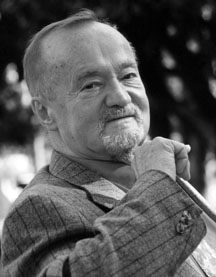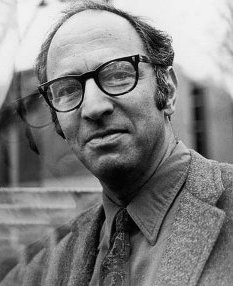
Epistemology, or the theory of knowledge, is the branch of philosophy concerned with knowledge. Epistemology is considered a major subfield of philosophy, along with other major subfields such as ethics, logic, and metaphysics.

Errol Mark Morris is an American film director known for documentaries that interrogate the epistemology of its subjects. In 2003, his documentary film The Fog of War: Eleven Lessons from the Life of Robert S. McNamara won the Academy Award for Best Documentary Feature. His film The Thin Blue Line placed fifth on Sight & Sound's poll of the greatest documentaries ever made. Morris is known for making films about unusual subjects; Fast, Cheap & Out of Control interweaves the stories of a wild animal trainer, a topiary gardener, a robot scientist and a naked mole rat specialist.

A paradigm shift, a concept brought into the common lexicon by the American physicist and philosopher Thomas Kuhn, is a fundamental change in the basic concepts and experimental practices of a scientific discipline. Even though Kuhn restricted the use of the term to the natural sciences, the concept of a paradigm shift has also been used in numerous non-scientific contexts to describe a profound change in a fundamental model or perception of events.
Relativism is a family of philosophical views which deny claims to objectivity within a particular domain and assert that valuations in that domain are relative to the perspective of an observer or the context in which they are assessed. There are many different forms of relativism, with a great deal of variation in scope and differing degrees of controversy among them. Moral relativism encompasses the differences in moral judgments among people and cultures. Epistemic relativism holds that there are no absolute principles regarding normative belief, justification, or rationality, and that there are only relative ones. Alethic relativism is the doctrine that there are no absolute truths, i.e., that truth is always relative to some particular frame of reference, such as a language or a culture. Some forms of relativism also bear a resemblance to philosophical skepticism. Descriptive relativism seeks to describe the differences among cultures and people without evaluation, while normative relativism evaluates the morality or truthfulness of views within a given framework.
Moral relativism or ethical relativism is used to describe several philosophical positions concerned with the differences in moral judgments across different peoples and cultures. An advocate of such ideas is often referred to as a relativist for short.

The Structure of Scientific Revolutions is a book about the history of science by philosopher Thomas S. Kuhn. Its publication was a landmark event in the history, philosophy, and sociology of science. Kuhn challenged the then prevailing view of progress in science in which scientific progress was viewed as "development-by-accumulation" of accepted facts and theories. Kuhn argued for an episodic model in which periods of conceptual continuity where there is cumulative progress, which Kuhn referred to as periods of "normal science", were interrupted by periods of revolutionary science. The discovery of "anomalies" during revolutions in science leads to new paradigms. New paradigms then ask new questions of old data, move beyond the mere "puzzle-solving" of the previous paradigm, change the rules of the game and the "map" directing new research.

Constructivism is a view in the philosophy of science that maintains that scientific knowledge is constructed by the scientific community, which seeks to measure and construct models of the natural world. According to the constructivist, natural science, therefore, consists of mental constructs that aim to explain sensory experience and measurements.

David Kellogg Lewis was an American philosopher who is widely regarded as one of the most important philosophers of the 20th century. Lewis taught briefly at UCLA and then at Princeton University from 1970 until his death. He is closely associated with Australia, whose philosophical community he visited almost annually for more than 30 years.
Truthmaker theory is "the branch of metaphysics that explores the relationships between what is true and what exists". The basic intuition behind truthmaker theory is that truth depends on being. For example, a perceptual experience of a green tree may be said to be true because there actually is a green tree. But if there was no tree there, it would be false. So the experience by itself does not ensure its truth or falsehood, it depends on something else. Expressed more generally, truthmaker theory is the thesis that "the truth of truthbearers depends on the existence of truthmakers". A perceptual experience is the truthbearer in the example above. Various representational entities, like beliefs, thoughts or assertions can act as truthbearers. Truthmaker theorists are divided about what type of entity plays the role of truthmaker; popular candidates include states of affairs and tropes.
Commensurability is a concept in the philosophy of science whereby scientific theories are said to be "commensurable" if scientists can discuss the theories using a shared nomenclature that allows direct comparison of them to determine which one is more valid or useful. On the other hand, theories are incommensurable if they are embedded in starkly contrasting conceptual frameworks whose languages do not overlap sufficiently to permit scientists to directly compare the theories or to cite empirical evidence favoring one theory over the other. Discussed by Ludwik Fleck in the 1930s, and popularized by Thomas Kuhn in the 1960s, the problem of incommensurability results in scientists talking past each other, as it were, while comparison of theories is muddled by confusions about terms, contexts and consequences.
Philosophical realism is usually not treated as a position of its own but as a stance towards other subject matters. Realism about a certain kind of thing is the thesis that this kind of thing has mind-independent existence, i.e. that it is not just a mere appearance in the eye of the beholder. This includes a number of positions within epistemology and metaphysics which express that a given thing instead exists independently of knowledge, thought, or understanding. This can apply to items such as the physical world, the past and future, other minds, and the self, though may also apply less directly to things such as universals, mathematical truths, moral truths, and thought itself. However, realism may also include various positions which instead reject metaphysical treatments of reality entirely.
Bastiaan Cornelis van Fraassen is a Dutch-American philosopher noted for his contributions to philosophy of science, epistemology and formal logic. He is a Distinguished Professor of Philosophy at San Francisco State University and the McCosh Professor of Philosophy Emeritus at Princeton University.

Stephen Edelston Toulmin was a British philosopher, author, and educator. Influenced by Ludwig Wittgenstein, Toulmin devoted his works to the analysis of moral reasoning. Throughout his writings, he sought to develop practical arguments which can be used effectively in evaluating the ethics behind moral issues. His works were later found useful in the field of rhetoric for analyzing rhetorical arguments. The Toulmin model of argumentation, a diagram containing six interrelated components used for analyzing arguments, and published in his 1958 book The Uses of Argument, was considered his most influential work, particularly in the field of rhetoric and communication, and in computer science.
Neopragmatism, sometimes called post-Deweyan pragmatism, linguistic pragmatism, or analytic pragmatism, is the philosophical tradition that infers that the meaning of words is a result of how they are used, rather than the objects they represent.
Objectivity in science is an attempt to uncover truths about the natural world by eliminating personal biases, emotions, and false beliefs. It is often linked to observation as part of the scientific method. It is thus intimately related to the aim of testability and reproducibility. To be considered objective, the results of measurement must be communicated from person to person, and then demonstrated for third parties, as an advance in a collective understanding of the world. Such demonstrable knowledge has ordinarily conferred demonstrable powers of prediction or technology.
A self-refuting idea or self-defeating idea is an idea or statement whose falsehood is a logical consequence of the act or situation of holding them to be true. Many ideas are called self-refuting by their detractors, and such accusations are therefore almost always controversial, with defenders stating that the idea is being misunderstood or that the argument is invalid. For these reasons, none of the ideas below are unambiguously or incontrovertibly self-refuting. These ideas are often used as axioms, which are definitions taken to be true, and cannot be used to test themselves, for doing so would lead to only two consequences: consistency or exception (self-contradiction).

The Manacled Mormon case, also known as the Mormon sex in chains case, was a case of reputed sexual assault and kidnap by an American woman, Joyce McKinney, of a young American Mormon missionary, Kirk Anderson, in England in 1977. Because McKinney and her accomplice skipped bail and fled to the United States before the case could be tried and were not extradited, they were never tried for these specific crimes. According to Anderson, he had been abducted by McKinney from the steps of a church meetinghouse, chained to a bed and raped by her.

American philosophy is the activity, corpus, and tradition of philosophers affiliated with the United States. The Internet Encyclopedia of Philosophy notes that while it lacks a "core of defining features, American Philosophy can nevertheless be seen as both reflecting and shaping collective American identity over the history of the nation". The philosophy of the founders of the United States is largely seen as an extension of the European Enlightenment. A small number of philosophies are known as American in origin, namely pragmatism and transcendentalism, with their most prominent proponents being the philosophers William James and Ralph Waldo Emerson respectively.

Thomas Samuel Kuhn was an American philosopher of science whose 1962 book The Structure of Scientific Revolutions was influential in both academic and popular circles, introducing the term paradigm shift, which has since become an English-language idiom.
In the philosophy of science, observations are said to be "theory-laden" when they are affected by the theoretical presuppositions held by the investigator. The thesis of theory-ladenness is most strongly associated with the late 1950s and early 1960s work of Norwood Russell Hanson, Thomas Kuhn, and Paul Feyerabend, and was probably first put forth by Pierre Duhem about 50 years earlier.










